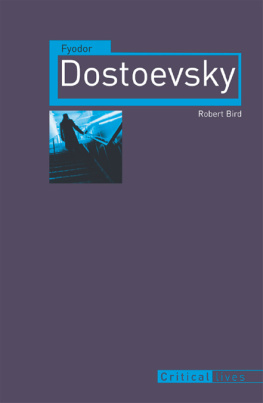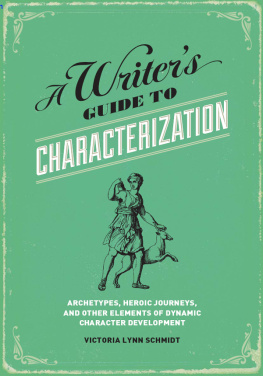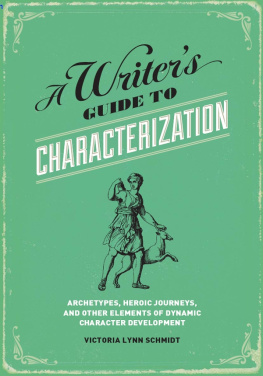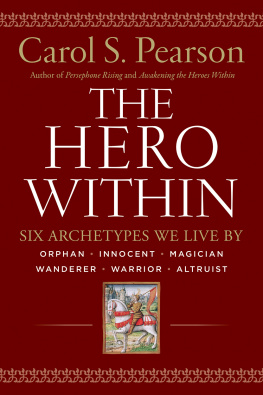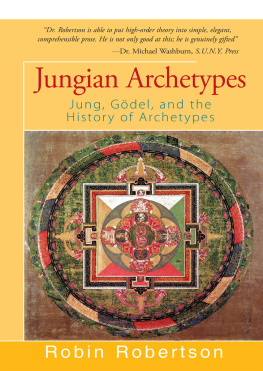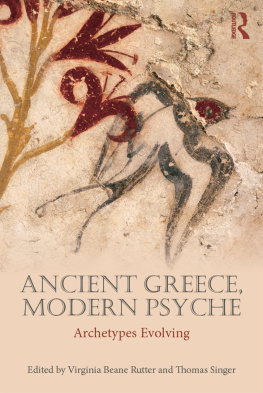ARCHETYPES
FROM
UNDERGROUND
ARCHETYPES
FROM
UNDERGROUND
NOTES ON THE DOSTOEVSKIAN SELF
LONNY HARRISON

This book has been published with the help of a grant from the Canadian Federation for the Humanities and Social Sciences, through the Awards to Scholarly Publications Program, using funds provided by the Social Sciences and Humanities Research Council of Canada. Wilfrid Laurier University Press acknowledges the support of the Canada Council for the Arts for our publishing program. We acknowledge the financial support of the Government of Canada through the Canada Book Fund for its publishing activities. This work was supported by the Research Support Fund.

Library and Archives Canada Cataloguing in Publication
Harrison, Lonny Roy, 1974, author Archetypes from underground : notes on the Dostoevskian self / Lonny Harrison.
Includes bibliographical references and index.
Issued in print and electronic formats.
ISBN 978-1-77112-204-7 (bound).ISBN 978-1-77112-206-1 (epub)
1. Dostoyevsky, Fyodor, 18211881Criticism and interpretation. 2. Archetype (Psychology) in literature. I. Title.
PG3328.Z6H37 2016 891.733 C2015-908612-4
C2015-908613-2
Cover and text design by Sarita Mielke and Daiva Villa, Chris Rowat Design.
2016 Wilfrid Laurier University Press
Waterloo, Ontario, Canada
www.wlupress.wlu.ca
This book is printed on FSC certified paper and is certified Ecologo. It contains post-consumer fibre, is processed chlorine free, and is manufactured using biogas energy.
Printed in Canada
Every reasonable effort has been made to acquire permission for copyright material used in this text, and to acknowledge all such indebtedness accurately. Any errors and omissions called to the publishers attention will be corrected in future printings.
No part of this publication may be reproduced, stored in a retrieval system, or transmitted, in any form or by any means, without the prior written consent of the publisher or a licence from the Canadian Copyright Licensing Agency (Access Copyright). For an Access Copyright licence, visit http://www.accesscopyright.ca or call toll free to 1-800-893-5777.
For Roy and Ziggy
Contents
Acknowledgements
The list of people I truly wish to thank is a lengthy one. In the limited space allotted here, let me recognize the individuals who were directly involved in bringing the present work to fruition, and a few others near to me who made it possible.
Thank you Donna Orwin, Robin Feuer Miller, and my professors at the University of Toronto, who held me to the highest standards of academic rigour during my doctoral studies. Thanks to Bill Barnett for his careful reading of an early draft of the manuscript and helpful suggestions, without which this book may never have seen the light of day. Special thanks to Caryl Emerson for reading the copy-edit and offering her generous endorsement of the book.
My most heartfelt thanks go to my colleagues and students at the University of Texas at Arlington. To my colleagues for your spirit of warmth and collegiality, and my students for surprising me daily with your precocity, hard work, and dedication. Enormous thanks and gratitude to my chair, Christopher Conway, for his indomitable energy and unswerving support of my scholarly work and professional goals.
I am forever indebted to friends and family, without whom I could not have made the first step on this journey. Thanks and boundless love to my wife, Maggie, for helping to discover the doorways, and walking the paths with me that led to here. Love and endless thanks to my mom and dad, who instilled the belief in me that I could do anything I put my mind to.
I am most beholden to the editors and staff at Wilfrid Laurier University Press for their enthusiastic and efficient work of turning my manuscript into the present book. My sincerest thanks to Lisa Quinn, Blaire Comacchio, Robert Kohlmeier, Clare Hitchens, and Mike Bechthold.
This book has been published with the help of a grant from the Federation for the Humanities and Social Sciences, through the Awards to Scholarly Publications Program, using funds provided by the Social Sciences and Humanities Research Council of Canada. Thank you to these agencies for the generous support.
Finally, I would like to acknowledge earlier versions of some of my ideas presented in this book that have been previously published. Special thanks to the respective editors and publishers for granting permission to make use of the following works:
The Numinous Experience of Ego Transcendence in Dostoevsky, Slavic and East European Journal 57, no. 3 (Fall 2013): 388402.
Reasonable to Ridiculous: The Inward Gaze of the Modern Self in Dostoevskii and Vladimir Odoevskii, Canadian Slavonic Papers 55, nos. 34 (SeptemberDecember 2013): 343363; copyright Canadian Association of Slavists, reprinted by permission of Taylor & Francis Ltd, www.tandfonline.com on behalf of Canadian Association of Slavists.
Note on Transliteration
I use the Library of Congress system of transliteration from Russian to English, except in the case of common spellings of personal names, such as Dostoevsky, Belinsky, or Nastasya.
For authors whose works are published in Russian, I revert to ii, as in Dostoevskii, or Belinskii, in the notes and Bibliography.
All translations are my own except where otherwise indicated.
INTRODUCTION
Dostoevskys Types and Archetypes
All of Dostoevskys characters, in their febrile determination to turn ideas into action, behave like people who have heard Christs warning, who deeply believe it, and yet are deeply evading it.
James Wood, The Irresponsible Self
Dostoevsky indicated time and again that he was interested in creating character typeshuman types that were unique and individualized but endowed with a capacity to express and embody the whole of humanity. He would say of his second novella, The Double (1846), that its ill-fated protagonist, Mr. Golyadkin, mirrored by his double, Golyadkin Jr., was a character of tremendous social significance, which [I] was the first to discover and proclaim. For years he intended to revise and improve the work, but by the time he began to, in the early 1860s, a new project had begun to take shapeone that would bring the underground to the fore and draw in the elements around it with centripetal force. Ultimately Dostoevsky abandoned his revisions of The Double in favour of writing Notes from Underground (1864).
Regarding Mr. Golyadkins more famous and notorious successor, the so-called Underground Man, Dostoevsky wrote in his preface to the novel that types
Dostoevskys social-cultural types are related to his own countrys development and adaptation to the major strains of thought and literary modes of the secular modern West. Russia was at the time in the throes of a crisis of national identity that was paramount in the minds of its writers and thinkers throughout much of the nineteenth century. It propelled virulent debates between Dostoevsky and rival factions of the left-wing intelligentsia, while all parties at the same time responded to thinkers and writers of the West, who informed parts of their world view. This problem, along with Dostoevskys views on his nations historical development and the character of its people, will be taken up at various points throughout this volume to provide a backdrop to the literary issues under examination. Ill argue that Dostoevskys social-cultural types, his take on Western ideas, and his feelings toward his nations people and their national identity are only pieces of a larger picture and the beginning of a longer story.
Next page


